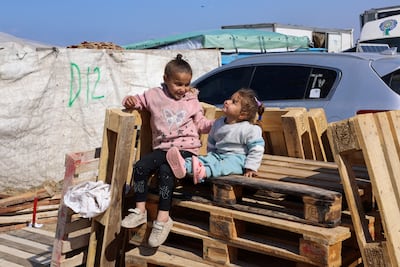Live updates: Follow the latest news on Israel-Gaza
Palestinians who have sought refuge in Rafah say there will be nowhere safe left to go if Israel's military attacks the southernmost city in the Gaza Strip.
As Israel's military offensive on Gaza enters its fifth month, Palestinians have been pushed into increasingly smaller areas seeking safety from Israeli air strikes and fighting on the ground.
Many have ended up in and around the city of Rafah, on the border with Egypt, and now dread being forced to move again.
"I don't want to move to another destination,” said Adel Reziq, who fled to Rafah from northern Gaza. "We've faced numerous obstacles and we're exhausted."
Israel has bombed Rafah repeatedly since October 7 but its ground offensive focused primarily on northern Gaza, before shifting to Khan Younis in the south, and central Gaza.
Concerns that Rafah would come under sustained attack increased last week after Israeli Defence Minister Yoav Gallant said the offensive would "continue to Rafah" as he announced the army had achieved its goals against Hamas in Khan Younis.
Despite the announcement, thousands of people are still being driven to Rafah every day, with Israeli evacuation orders now covering more than two thirds of the Gaza Strip, the UN's humanitarian agency Ocha says.
The agency estimates more than half of Gaza's prewar population of 2.3 million people are now crammed in Rafah and surrounding camps, living in overcrowded conditions.
Mr Reziq said he was living in a single house with 40 members of his family.
The threat of an Israeli attack on Rafah means they are now facing three options, he told The National.
One was to return north, to the devastated areas of the enclave that were the initial focus of Israel's military offensive against Hamas. Most homes in Gaza city and surrounding areas have been destroyed, and the family would have to pass through dangerous checkpoints to reach their destination.
The other options are to head deeper into Rafah city or closer to the Egyptian border, he said.
Nagham Morshid, who used to live in Gaza city in the north, is now living in a tent in Rafah.
“Even if the Israeli army asks us to go back to the north, I don't have the energy to do so,” she told The National. "There is no life in Gaza now – no food, no water, no streets, no homes.
"It's been more than 120 days [of war] and we don't know why all of this happened. We don't have any future plans."

Another displaced Gazan, who refused to give his name for fear of his safety, said he had sought refuge near the Philadelphia corridor – a narrow strip of land extending 14km along the border with Egypt – after being forced to move four times from northern Gaza to the south of the Palestinian enclave.
"We hear that Israeli forces could attack the area at any time," he told The National. "We are worried and don't know what the next scenario could be."
"There is no safe place any more. People have run out of money and food, and the next step is to end the war."
More than 27,400 Palestinians have been confirmed killed in Israel's ground and aerial campaign in Gaza, the Hamas-run Health Ministry said on Tuesday, with thousands more feared buried under rubble of bombarded buildings across the densely populated enclave.
At least 107 have been killed in the past 24 hours, the ministry said. Israeli forces said they killed dozens of Palestinian militants during the same period in operations focused on Khan Younis.
Facing constant Israeli attacks and acute shortages of food and other essentials, Palestinians have been pinning their hopes on a potential ceasefire agreement between Israel and Hamas, though a deal has yet to be reached.
The ceasefire plan, as described by sources close to the talks, envisages a truce of at least 40 days during which Hamas would free civilians among the remaining hostages they are holding, followed by a phased handing over of soldiers, in exchange for the release of Palestinians imprisoned in Israel.


